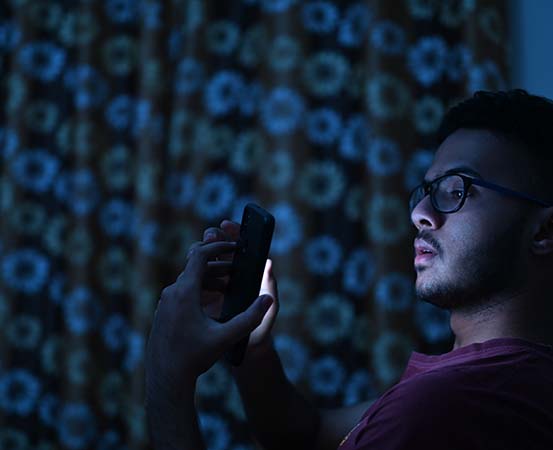
Gowri Gupta (21) – an engineering student from Belagavi, Karnataka – makes time to talk to her family every night on the phone. Sometimes, the conversation lingers for hours. “If my phone conversations extend for long, I observe that I feel drowsy the next morning,” she says. But busy college life leaves her with no time during the day. She has no choice but to connect with her family at night.
“Sleep is incredibly connected to every physiological process in the human body,” says Teresa Powe DeNike, a certified sleep coach from New York. She points out that during certain stages of sleep, the brain is incredibly active, performing functions such as storing new information and discarding trivial ones. Long calls during the night can potentially affect this process.
According to research conducted in 2016 by Liese Exelmans and Jan Van den Bulck, being on phone calls during the night showed longer sleep latency (time taken for a person to fall asleep), decreased sleep efficiency, more sleep disturbances and more daytime dysfunction in adults.
How late-night calls can affect sleep/health
Dr Funke Afolabi Brown, a sleep medicine expert from the UK says, “The flash of blue light [from the phone] can suppress the production of melatonin [the hormone crucial for sleep]. The arousal and excitement that take place while on a call and in anticipation of a call can also disturb our sleep pattern.”
“Being on phone calls during the night will affect the sleep duration and this could lead to sleep deprivation. When an individual has a phone conversation during the night, this also influences the mood; this can cause difficulty sleeping,” says Dr Karthik Madesh, ENT specialist, Apollo Specialty Hospitals, Chennai.
Being on the phone for too long, regardless of the time of day, could lead to moisture build-up in the ear and this can lead to infections, points out Dr David McIntosh, an ENT specialist from Maroochydore, Queensland, Australia. “So, if you get a late-night phone call, it is best to politely ask the caller to keep the conversation short. Also, use a loudspeaker if you are going to be on the phone for a while,” he says.
Apart from affecting hearing ability, cell phone radiations can hamper cardiac and circadian rhythms, says Dr Mercy Sabu, head of department, ENT, St Martha’s hospital, Bengaluru. Circadian rhythm facilitates the sleep-wake cycle; a disturbance in this cycle can disrupt sleep. “The radiation emitted by the device [phone] can have long-term effects on health. The effects elicited can be varied based on one’s health condition, age and so on. But the damaging effects are certain,” notes Dr Sabu, adding that one should avoid placing the phone on the bed while sleeping to not only avoid the radiation, but also the urge to use it.
Ways to get good sleep
Experts suggest the following tips for ensuring good quality sleep:
- Schedule calls for the day as far as possible. This will give you ample time to sleep at night.
- Avoid phone conversations at least an hour before bed. This can prevent the disturbance in sleep patterns due to mood fluctuations.
- The bedtime environment should be noise-free, dark and of optimum temperature. All these help in the production of melatonin.
- Assign the bed only for sleeping and not for any other activity. Hence, avoid answering phone calls when in bed. Practising this will help our body create an association in our brain and falling asleep will be easier.
- Meditating before bedtime can calm our anxious minds and help us sleep better.
Takeaways
Indulging in long phone conversations during the night can cause sleep deprivation and daytime fatigue. The stimulation that occurs due to phone calls could cause mood fluctuations. This can lead to difficulty sleeping. Following a good sleep routine and avoiding gadgets an hour before bed can help us sleep better.

















